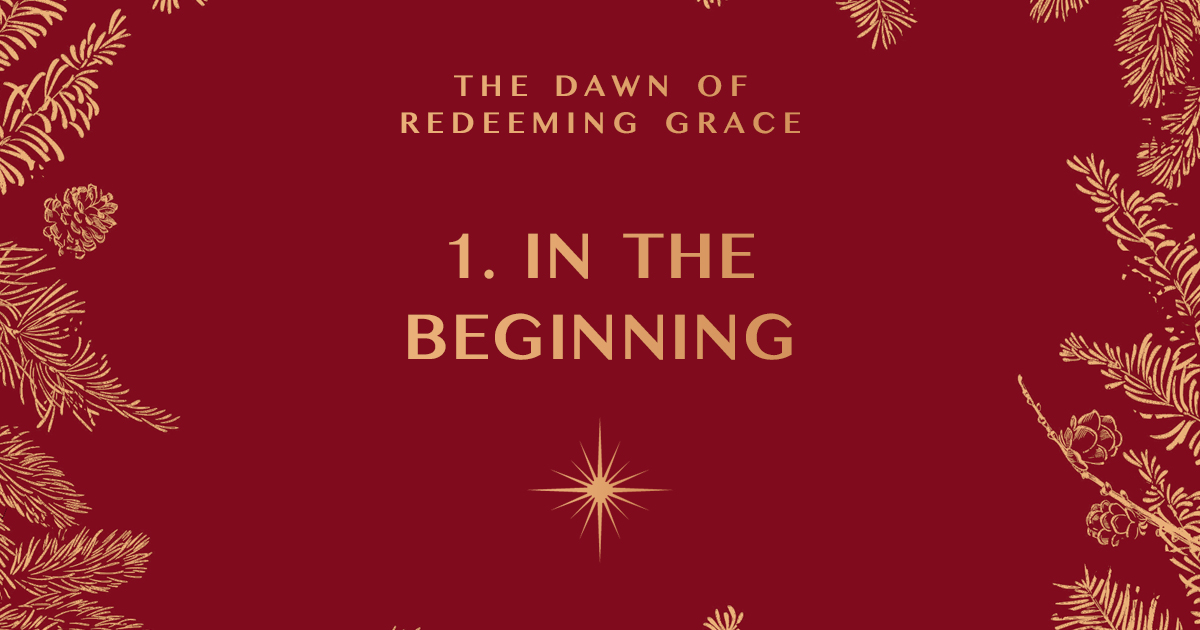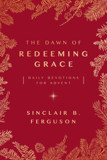The Good Book Company (Australia) will be closed from Saturday 21st December until Thursday 2nd January. Any orders placed during this time will be held and dispatched on Thursday 2nd January 2025. Emails will still be checked. Apologies for any inconvenience this causes.

The following is an extract of Day 1 of Sinclair Ferguson’s new Advent devotional, The Dawn of Redeeming Grace. Available as a paperback and audiobook read by Sinclair himself.
The first words of a book are important. They can make you read it or make you close it!
Some time ago I began to read the biographies of two contemporaries who were on opposite sides of the American Revolution. One biography began with an explanation of the subject’s complex family tree and varied royal connections; the other with these words:
“In the cold, nearly colorless light of a New England winter, two men on horseback travelled the coast road below Boston, heading north.”
You can guess which book I kept reading. The first quickly lost my interest. Family connections can be very confusing and—at least outside the family—are interesting to only a few. But I wanted to know more about the two men on the Boston coast road; who were they and why were they there in the first place? My attention was captured immediately (and sustained to the last page).
The opening section in Matthew’s Gospel isn’t exactly an attention-grabber for most of us. It is a long list of largely unfamiliar names. Some of them we may not even be sure how to pronounce. We don’t usually read this part of Matthew in Christmas services!
But these opening words would have grabbed the attention of Matthew’s first Jewish readers and hearers (and most of them were hearers). Literally they read, “Book of [the] genesis of Jesus Christ, son of David, Son of God.” To a certain generation, “Genesis” is a famous band from the 1980s and 90s; but for Matthew’s audience “genesis” meant “beginning.” It is the name of the first book of the Bible, the story of the original beginning.
"As we stand in the opening pages of Matthew’s Gospel, God is bringing about a grand reversal."
This word choice was not accidental. Matthew’s book is the story of a new genesis—of a new beginning. His Gospel, and indeed the Christian gospel message as a whole, is about God establishing his kingdom and beginning what Paul called a “new creation” (2 Corinthians 5:17).
Matthew’s Gospel has sometimes been described as “The Gospel of the kingdom.” He tells us how Jesus taught about “the kingdom,” how his miracles were signs of its presence, and how he explained the new and different lifestyle of its members (Matthew 4:23 – 7:29). Matthew also ends his Gospel with an indication of Jesus’ kingship. Jesus’ last words to the apostles are these: “All authority in heaven and on earth has been given to me...” (28:18). Now his rule will be extended to the ends of the earth and to the close of history.
The gospel story is all about how Jesus Christ, the son of David, in God’s kingdom restores life to what it was meant to be. In other words, it is about a new genesis.
Think back to the original creation. In that first beginning, God created mankind, male and female, as his image and likeness. He said, “Let them have dominion...” (Genesis 1:26). They were royal children appointed to reign over the kingdom of creation. But Genesis tells the story of their tragic fall from that privileged role. Their calling was to turn the dust of the earth into a garden (1:26 – 2:25). Instead, they sinned and became part of that dust themselves (3:17-19).
But now, as we stand in the opening pages of Matthew’s Gospel, God is bringing about a grand reversal. The whole story of the Old Testament has been a preparation for it. Now the new beginning has begun. What follows will tell the story of how Jesus undid the effects of Adam’s fall, and accomplished what Adam and we have failed to do. The result will be a “new creation”: what Matthew calls “the new world” (Matthew 19:28)—literally the palingenesia—the beginning again!

Advent devotional for Christmas that will stir hope and inspire worship.
So, Matthew’s opening words are good news for anyone who needs a new beginning. That’s why his Gospel ends with Jesus telling his apostles (who were all Jews) that they were to go to the ends of the earth with the message that the dominion, and authority, and the kingdom of God, have all been restored. Christ has inaugurated a new genesis in which all who come to faith in him will share.
But still, we’re left with the question: why then this seemingly endless list of names?
The answer lies in the three ways in which Matthew describes Jesus.
First, Jesus is the Christ. Matthew mentions this fact four times here (1:1, 16, 17, 18). “Christ” is the Greek equivalent of the Hebrew word “Messiah,” meaning the anointed King whom God had promised to send to deliver his people from bondage. That’s who Jesus is.
But Jesus is also the son of David (1:1). Why is that important? Because God had promised that a descendant of David would reign over a kingdom that would stretch from one end of the earth to the other. That king would restore the world Adam marred.
And Jesus is also a son of Abraham (1:1). For even earlier God had promised that this same person would be descended from Abraham, and in him all the nations of the earth would be blessed—they would experience the blessing that Adam had forfeited through his sin (Genesis 12:1-3).
There is more to come in Jesus’ genealogy. It isn’t at all what you might expect. But that will need to wait. For today let us ponder the fact that Advent is all about the new beginning God has made possible by sending his Son for us.
Perhaps a new beginning is what you need most. As you reach the end of another year, is there some aspect of the previous twelve months in which you wish you could start over? If so, Matthew wants you to know that you can find that new beginning in Jesus Christ.

Earth was waiting, spent and restless,
With a mingled hope and fear;
And the faithful few were sighing,
“Surely, Lord, the day is near;
The desire of all the nations,
It is time he should appear.
Earth for him had groaned and travailed
Since the ages first began,
For in him was hid the secret
That through all the ages ran—
Son of Mary, Son of David,
Son of God, and Son of Man.
“Earth was Waiting, Spent and Restless”
Walter Chalmers Smith (1824-1908)

Lord Jesus, you came into the world so that we might have a new beginning. Thank you that your word assures us that everyone who belongs to you becomes part of a new creation. Work in us your new creation so that your kingdom may come in our lives. Amen.